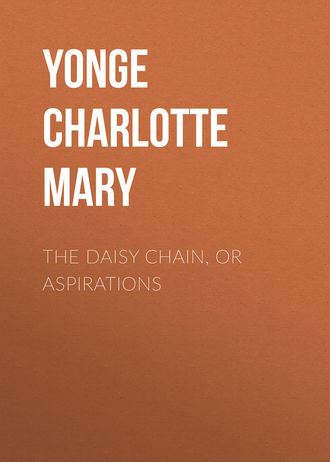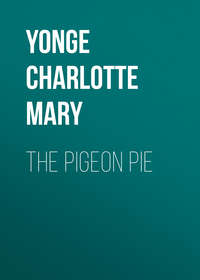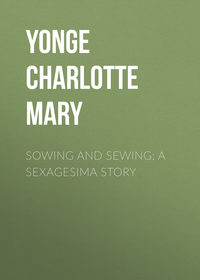
The Daisy Chain, or Aspirations
“Remember it? Do I not? From the frosted cedar downwards! It was the first gem of spring in that dreary winter. What a Fairyland the Grange was to me!”
“You may nearly say the same of me,” confessed Dr. May, smiling; “the sight of that happy little sunny spirit, full of sympathy and sweetness, always sent me brighter on my way. Wherever you may be, Norman, I am glad you have her, being one apt to need a pocket sunbeam.”
“I hope my tendencies are in no danger of depressing her!” said Norman, startled. “If so—”
“No such thing—she will make a different man of you. You have been depressed by—that early shock, and the gap at our own fireside—all that we have shared together, Norman. To see you begin on a new score, with a bright home of your own, is the best in this world that I could wish for you, though I shall live over my own twenty-two years in thinking of you, and that sweet little fairy. But now go, Norman—she will be watching for you and news of Margaret. Give her all sorts of love from me.”
Norman fared better with the uncle than he had expected. Lord Cosham, as a philanthropist, could not, with any consistency, set his face against missions, even when the cost came so near home; and he knew that opposition made the like intentions assume a heroic aspect that maintained them in greater force. He therefore went over the subject in a calm dispassionate manner, which exacted full and grateful consideration from the young man.
The final compromise was, that nothing should be settled for a year, during which Norman would complete his course of study, and the matter might be more fully weighed. Mrs. Arnott would probably return, and bring experience and judgment, which would, or ought to, decide the question—though Meta had a secret fear that it might render it more complicated than ever. However, the engagement and the mission views had both been treated so much more favourably than could have been hoped, that they felt themselves bound to be patient and forbearing. As Meta said, “If they showed themselves wilful children, they certainly did not deserve to be trusted anywhere.”
Lord Cosham made his niece listen to a kind exhortation not to press her influence towards a decision that might be repented, when too late to be repaired, without a degrading sense of failure—putting her in mind of the privations that would lose romance by their pettiness, and which money could not remedy; and very sensibly representing that the effect of these on temper and health was to be duly considered as a serious impediment to usefulness.
“It would be worse for him alone,” said Meta.
“That is not certain,” said her uncle. “A broken-down wife is a terrible drag.”
“I know it is so,” said Meta firmly, “but risks must be run, and he is willing to take the chance. I do not think it can be presumption, for, you know, I am strong; and Dr. May would say if he could not warrant me. I fancy household work would be more satisfactory and less tiring than doing a season thoroughly, and I mean to go through a course of Finchley manuals in preparation.”
“I hope you know what you are doing,” sighed her uncle. “You see it all couleur de rose.”
“I think not. It is because it is not couleur de rose that I am so much bent upon it. I have had plenty of that all my life. I expect much that will be very disagreeable and not at all heroic; but if I can only make Norman think it fun, that will be one purpose answered. I do believe he will do his work better for having me, and, at least, I shall pay his passage.”
Her uncle shook his head, but did not try to say any more. George had begun by loud exclamations against the project, in which he was vehemently abetted by Tom, who primed him with all sorts of outrageous abuse of the niggers and cannibals, who would make Norman’s coats out of all shape, and devour little Meta at a mouthful—predictions which Meta accepted most merrily, talking of herself so resignedly, as bound upon a spit, and calling out to be roasted slower and faster, that she safely conducted off their opposition by way of a standing joke. As to Norman’s coats, she threatened to make them herself, and silenced Tom for ever by supposing, in malicious simplicity, that he must be able to teach her the most unexceptional cut.
Flora kept her opinions to herself. Only once, when urged to remonstrate, she said, “I could not—I would not.”
She was gently and touchingly considerate towards the lovers, silently but unobtrusively obviating all that could jar on their feelings, and employing her exquisite tact in the kindest manner.
She released Meta from the expedition to Ryde, silencing scruples on the one hand, by a suggestion of “poor Sir Henry,” and, on the other, by offering to exchange her for Mary. The first proposal made Mary take such a spring in her chair, with eyes so round, and cheeks so red, and such a shriek about Harry and the Bucephalus, that no one could have borne to say one word in opposition, even if it had not been the opinion of the Council that sea air would best repair Mary’s strength.
Ethel had some private fears of a scene, since it was one of Miss Bracy’s idiosyncrasies to be hurt whenever Mary was taken out of her hands; and she went to announce the design, in dread lest this shock should destroy the harmony that had prevailed for many months; nay, she almost believed, since the loss of the Alcestis had been known.
She was agreeably surprised. Miss Bracy thought Mary in need of the change, and discussed both her and Blanche in so pleasant and sensible a manner, that Ethel was quite relieved. She partook in Mary’s anticipations of pleasure, forwarded her preparations, and was delighted with her promise of letters—promises that Mary bestowed so largely, in the fullness of her heart, that there were fears lest her whole time should be spent in writing.
Her soft heart indulged in a shower of tears when she wished them all good-bye; and Ethel and Blanche found the house was very empty without her; but that was only till Meta came in from a walk with Norman, and, under the plea of trying to supply Mary’s place, did the work of five Maries, and a great deal besides.
Nothing could be happier than Meta’s visit, brightening the house so that the Mays thought they had never known half her charms, helping whatever was going on, yet ready to play with Daisy, tell stories to Aubrey, hear Tom’s confidences, talk to Margaret, read with Norman, and teach Richard singing for his school children. The only vexation was, that every one could not always engross her entirely; and Dr. May used to threaten that they should never spare her to that long-legged fellow, Norman.
She had persuaded Bellairs to go and take care of Flora and Mary, instead of the French maid—a plan which greatly satisfied Margaret, who had never liked the looks of Coralie, and which Meta held to be a grand emancipation. She persuaded old nurse to teach her to be useful, and Margaret used to declare that she witnessed scenes as good as a play in her room, where the little dexterous scholar, apparently in jest, but really in sober, earnest, wiled instruction from the old woman; and made her experiments, between smiles and blushes, and merrily glorying in results that promised that she would be a notable housewife. Whether it were novelty or not, she certainly had an aptitude and delight in domestic details, such as Ethel never could attain; and, as Dr. May said, the one performed by a little finger what the other laboured at with a great mind.
In the schoolroom, Meta was as highly appreciated. She found an hour for helping Blanche in her music, and for giving, what was still more useful, an interest and spirit to studies, where, it must be owned, poor good Mary had been a dead weight. She enlivened Miss Bracy so much, and so often contrived a walk or a talk with her, that the saucy Blanche told Hector that she thought Ethel would be quite second-fiddle with Miss Bracy.
No such thing. Miss Bracy’s great delight was in having a listener for her enthusiasm about Miss Ethel. She had been lately having a correspondence with a former school-fellow, who was governess in a family less considerate than the Mays, and who poured out, in her letters, feelings much like those with which Miss Bracy had begun.
Nothing could be more salutary than to find herself repeating all Ethel’s pieces of advice; and, one day, when her friend had been more distressed than usual, she called Ethel herself, to consult on her answer, owning how much she was reminded of herself.
“Indeed,” she added, “I am afraid it would only tease you to hear how much I am indebted to your decision and kindness—”
“Nay,” said Ethel, laughing her awkward laugh. “You have often had to forget my savage ways.”
“Pray don’t say that—”
“I think,” said Ethel, breaking in, “the philosophy is this: I believe that it is a trying life. I know teaching takes a great deal out of one; and loneliness may cause tendencies to dwell on fancied slights in trifles, that might otherwise be hurried over. But I think the thing is, to pass them over, and make a conscience of turning one’s mind to something fresh—”
“As you made me do, when you brought me amusing books, and taught me botany—”
“And, still more, when you took to working for the infant school. Yes, I think the way to be happy and useful is to get up many interests, so as to be fresh and vigorous, and think not at all of personalities. There’s a truism!”
“Very true, though,” said Miss Bracy. “Indeed, all your kindness and consideration would never have done me half the good they have, dear Miss Ethel, if you had not taught me that referring all to one’s own feelings and self is the way to be unhappy.”
“Just so,” said Ethel. “It is the surest way for any one to be miserable.”
“If I could only persuade poor dear Ellen to think that even if a slight were real, it ought to be borne forgivingly, and not brooded over. Ah! you are laughing; perhaps you have said the same about me.”
“You would forgive it now, I think,” said Ethel.
“I never thought I did not forgive. I did not see that brooding over vexations was not pardoning them. I have told her so now; and, oh! if she could but have seen how true sorrows are borne here, she would be cured, like me, of making imaginary ones.”
“None could help being better for living with papa,” said Ethel.
Ethel made Miss Bracy happy by a kiss before she left her. It was a cheering belief that, whatever the future trials of her life might be, the gentle little lady would meet them with a healthier mind, more vigorous in overlooking troubles and without punctilious sensitiveness on the lookout for affronts. “Believing all things, bearing all things, hoping all things, enduring all things,” would be to her the true secret of serenity of spirits.
Ethel might not have been blameless or consistent in her dealings in this difficult intercourse, but her kind heart, upright intention, and force of character, had influence far beyond her own perception. Indeed, she knew not that she had personal influence at all, but went on in her own straightforward humility.
CHAPTER XXIV
“Enough of foresight sad, too much Of retrospect have I; And well for me, that I, sometimes, Can put those feelings by. There speaks the man we knew of yore, Well pleased, I hear them say; Such was he, in his lighter moods, Before our heads were gray. Buoyant he was in spirit, quick Of fancy, light of heart; And care, and time, and change have left Untouch’d his better part.”—SOUTHEY.Etheldred May and Meta Rivers were together in the drawing-room. The timepiece pointed towards ten o’clock, but the tea-things were on the table, prepared for a meal, the lamp shone with a sort of consciousness, and Ethel moved restlessly about, sometimes settling her tea equipage, sometimes putting away a stray book, or resorting by turns to her book, or to work a red and gold scroll on coarse canvas, on the other end of which Meta was employed.
“Nervous, Ethel?” said Meta, looking up with a merry provoking smile, knowing how much the word would displease.
“That is for you,” retorted Ethel, preferring to carry the war into the enemy’s quarters. “What, don’t you know that prudent people say that your fate depends on her report?”
“At least,” said Meta, laughing; “she is a living instance that every one is not eaten up, and we shall see if she fulfils Tom’s prediction of being tattooed, or of having a slice out of the fattest part of her cheek.”
“I know very well,” said Ethel, “the worst she said it would be, the more you would go.”
“Not quite that,” said Meta, blushing, and looking down.
“Come, don’t be deceitful!” said Ethel. “You know very well that you are still more bent on it than you were last year.”
“To be sure I am!” said Meta, looking up with a sudden beamy flash of her dark eyes. “Norman and I know each other so much better now,” she added, rather falteringly.
“Ay! I know you are ready to go through thick and thin, and that is why I give my consent and approbation. You are not to be stopped for nonsense.”
“Not for nonsense, certainly,” said Meta, “but”—and her voice became tremulous—“if Dr. May deliberately said it would be wrong, and that I should be an encumbrance and perplexity, I am making up my mind to the chance.”
“But what would you do?” asked Ethel.
“I don’t know. You should not ask such questions, Ethel.”
“Well! it won’t happen, so it is no use to talk about it,” said Ethel. “Fancy my having made you cry.”
“Very silly of me,” said Meta, brightening and laughing, but sighing. “I am only afraid Mrs. Arnott may think me individually unfit for the kind of life, as if I could not do what other women can. Do I look so?”
“You look as if you were meant to be put under a glass case!” said Ethel, surveying the little elegant figure, whose great characteristic was a look of exquisite finish, not only in the features and colouring, the turn of the head, and the shape of the small rosy-tipped fingers, but in everything she wore, from the braids of black silk hair, to the little shoe on her foot, and even in the very lightness and gaiety of her movements.
“Oh, Ethel!” cried Meta, springing up in dismay, and looking at herself in the glass. “What is the matter with me? Do tell me!”
“You’ll never get rid of it,” said Ethel, “unless you get yourself tattooed! Even separation from Bellairs hasn’t answered. And, after all, I don’t think it would be any satisfaction to Norman or papa. I assure you, Meta, whatever you may think of it, it is not so much bother to be prettier than needful, as it is to be uglier than needful.”
“What is needful?” said Meta, much amused.
“I suppose to be like Mary, so that nobody should take notice of one, but that one’s own people may have the satisfaction of saying, ‘she is pleasing,’ or ‘she is in good looks.’ I think Gertrude will come to that. That’s one comfort.”
“That is your own case, Ethel. I have heard those very things said of you.”
“Of my hatchet face!” said Ethel contemptuously. “Some one must have been desperately bent on flattering the Member’s family.”
“I could repeat more,” said Meta, “if I were to go back to the Commemoration, and to the day you went home.”
Ethel crimsoned, and made a sign with her hand, exclaiming, “Hark!”
“It went past.”
“It was the omnibus. She must be walking down!” Ethel breathed short, and wandered aimlessly about; Meta put her arm round her waist.
“I did not think this would be so much to you,” she said.
“Oh, Meta, it seems like dear mamma coming to see how we have been going on. And then papa! I wish I had gone up to the station with him.”
“He has Richard.”
“Ay, but I am afraid Margaret is listening and will be restless, and have a palpitation; and I can’t go and see, or I shall disturb her. Oh, I wish it were over.”
Meta stroked her, and soothed her, and assured her that all would do well, and presently they heard the click of the door. Ethel flew into the hall, where she stopped short, her heart beating high at the sound of overpoweringly familiar accents.
She was almost relieved by detecting otherwise little resemblance; the height was nearly the same, but there was not the plump softness of outline. Mrs. Arnott was small, thin, brisk and active, with a vivacious countenance, once evidently very fair and pretty, but aged and worn by toil, not trouble, for the furrows were the traces of smiles around her merry mouth, and beautiful blue eyes, that had a tendency lo laugh and cry both at once. Dr. May who had led her into the light, seemed to be looking her all over, while Richard was taking the wraps from her, and Ethel tried to encourage herself to go forward.
“Ay!” said the doctor, kissing her. “I see you, Flora, now. I have found you again.”
“I found you as soon as I heard your voice, Richard,” said she. “And now for the bairnies.”
“Here is one, but there is but a poor show forthcoming to-night. Do you know her?”
There was an unspeakable joy in being pressed in Aunt Flora’s arms, like a returning beam from the sunshine of seven years ago.
“This must be Ethel! My dear, how you tower above me—you that I left in arms! And,” as she advanced into the drawing-room—“why, surely this is not Margaret!”
“A Margaret—not the Margaret. I wish I were,” said Meta, as Mrs. Arnott stood with an arm on her shoulder, in the midst of an embrace, Dr. May enjoying her perplexity and Meta’s blushes. “See, Flora, these black locks never belonged to Calton Hill daisies, yet a daisy of my own she is. Can’t you guess?”
“Miss Rivers!” exclaimed Mrs. Arnott; and though she kissed her cordially, Meta suspected a little doubt and disappointment.
“Yes,” said Dr. May. “We change Mary for this little woman as Flora’s lady-in-waiting, when she and her husband go out yachting and shooting.”
“Flora and her husband! There’s a marvellous sound! Where are they?”
“They are staying at Eccleswood Castle,” said Ethel; “and Mary with them. They would have been at home to receive you, but your note yesterday took us all by surprise. Norman is away too, at a college meeting.”
“And Margaret—my Margaret! Does not she come downstairs?”
“Ah! poor dear,” said Dr. May, “she has not been in this room since that sultry day in July.”
“The eighteenth,” said Richard; the precision of the date marking but too well the consciousness that it was an epoch.
“We can keep her quieter upstairs,” said Dr. May; “but you must not see her to-night. She will enjoy you very much to-morrow; but excitement at night always does her harm, so we put her to bed, and told her to think about no one.”
Mrs. Arnott looked at him as if longing, but dreading, to ask further, and allowed her nephew and niece to seat her at the table, and attend to her wants, before she spoke again. “Then the babies.”
“We don’t keep babies, Gertrude would tell you,” said Dr. May. “There are three great creatures, whom Ethel barbarously ordered off to bed. Ethel is master here, you must know, Flora—we all mind what she says.”
“Oh, papa,” pleaded Ethel, distressed, “you know it was because I thought numbers might be oppressive.”
“I never dispute,” said Dr. May. “We bow to a beneficial despotism, and never rebel, do we, Meta?”
Seeing that Ethel took the imputation to heart, Meta rejoined, “You are making Mrs. Arnott think her the strong-minded woman of the family, who winds up the clock and cuts the bread.”
“No; that she makes you do, when the boys are away.”
“Of course,” said Ethel, “I can’t be vituperated about hunches of bread. I have quite enough to bear on the score of tea.”
“Your tea is very good,” said Richard.
“See how they propitiate her,” maliciously observed the doctor.
“Not at all; it is Richard standing up for his pupil,” said Ethel. “It is all very well now, with people who know the capacities of mortal tea; but the boys expect it to last from seven o’clock to ten, through an unlimited number of cups, till I have announced that a teapot must be carved on my tombstone, with an epitaph, ‘Died of unreasonable requirements.’”
Mrs. Arnott looked from one to the other, amused, observant, and perceiving that they were all under that form of shyness which brings up family wit to hide embarrassment or emotion.
“Is Harry one of these unreasonable boys?” she asked. “My dear Harry—I presume Ethel has not sent him to bed. Is there any hope of my seeing him?”
“Great hope,” said Dr. May. “He has been in the Baltic fleet, a pretty little summer trip, from which we expect him to return any day. My old Lion! I am glad you had him for a little while, Flora.
“Dear fellow! his only fault was being homesick, and making me catch the infection.”
“I am glad you did not put off your coming,” said Dr. May gravely.
“You are in time for the consecration,” said Richard.
“Ah! Cocksmoor! When will it take place?”
“On St. Andrew’s Day. It is St. Andrew’s Church, and the bishop fixed the day, otherwise it is a disappointment that Hector cannot be present.”
“Hector?”
“Hector Ernescliffe—poor Alan’s brother, whom we don’t well know from ourselves.”
“And you are curate, Ritchie?” said his aunt—“if I may still call you so. You are not a bit altered from the mouse you used to be.”
“Church mouse to Cocksmoor,” said Dr. May, “nearly as poor. We are to invest his patrimony in a parsonage as soon as our architect in ordinary can find time for it. Spencer—you remember him?”
“I remember how you and he used to be inseparable! And he has settled down, at last, by your side?”
“The two old doctors hope to bolster each other up till Mr. Tom comes down with modern science in full force. That boy will do great things—he has as clear a head as I ever knew.”
“And more—” said Ethel.
“Ay, as sound a heart. I must find you his tutor’s letter, Flora. They have had a row in his tutor’s house at Eton, and our boys made a gallant stand for the right, Tom especially, guarding the little fellows in a way that does one good to hear of.”
“‘I must express my strong sense of gratitude for his truth, uprightness, and moral courage,’” quoted Meta.
“Ah, ha! you have learned it by heart! I know you copied it out for Norman, who has the best right to rejoice.”
“You have a set of children to be proud of, Richard!” exclaimed Mrs. Arnott.
“To be surprised at—to be thankful for,” said Dr. May, almost inarticulately.
To see her father so happy with Mrs. Arnott necessarily drew Ethel’s heart towards her; and, when they had bidden him goodnight, the aunt instantly assumed a caressing confidence towards Ethel, particularly comfortable to one consciously backward and awkward, and making her feel as intimate as if the whole space of her rational life had not elapsed since their last meeting.
“Must you go, my dear?” said her aunt, detaining her over her fire. “I can’t tell how to spare you. I want to hear of your dear father. He looks aged and thin, Ethel, and yet that sweet expression is the same as ever. Is he very anxious about poor Margaret?”
“Not exactly anxious,” said Ethel mournfully—“there is not much room for that.”
“My dear Ethel—you don’t mean?—I thought—”
“I suppose we ought to have written more fully,” said Ethel; “but it has been very gradual, and we never say it to ourselves. She is as bright, and happy, and comfortable as ever, in general, and, perhaps, may be so for a long time yet, but each attack weakens her.”
“What kind of attack?”
“Faintness-sinking. It is suspended action of the heart. The injury to the spine deranged the system, and then the long suspense, and the shock—It is not one thing more than another, but it must go on. Dr. Spencer will tell you. You won’t ask papa too much about it?”
“No, indeed. And he bears it—”
“He bears everything. Strength comes up out of his great lovingness. But, oh! I sometimes long that he may never have any more sorrows.”
“My poor child!” said Mrs. Arnott, putting her arm round her niece’s waist.
Ethel rested her head on her shoulder. “Aunt Flora! Aunt Flora! If any words could tell what Margaret has been ever since we were left. Oh, don’t make me talk or think of ourselves without her. It is wrong to wish. And when you see her, that dear face of hers will make you happy in the present. Then,” added Ethel, not able to leave off with such a subject, “you have our Norman to see.”









